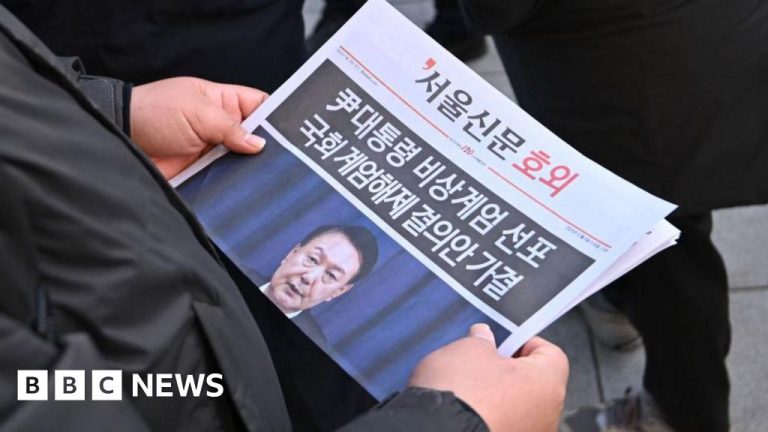Getty Images
South Korean President Yoon Suk Yeol's future hangs in the balance after a chaotic night in which he dramatically declared martial law and then just as suddenly withdrew it, plunging the country into turmoil.
Yoon, who won the top job by a whisker in 2022, was already deeply unpopular and under increasing pressure since his defeat in April's parliamentary election, seen as a vote of confidence in his tenure.
He is also facing personal problems. Last month, he apologized in a televised address to the nation for a series of controversies surrounding his wife, including allegedly accepting a luxury Dior handbag and stock manipulation.
He is now being asked to resign and lawmakers have announced they will impeach him.
The short-lived attempt to impose martial law on Tuesday evening took everyone by surprise.
Lawmakers rushed to the National Assembly in Seoul to vote against the order. Outside, police gathered as thousands of protesters gathered in fury.
The same crowd erupted in joy when Yoon reversed course hours later and said he would withdraw the martial law order.
That he would play such a high-stakes game, then back down so easily, came as a surprise to South Koreans and the rest of the world.
Access to power
Yoon was a newcomer to politics when he won the presidency. He rose to national prominence by prosecuting the corruption case against disgraced former president Park Geun-hye in 2016.
In 2022, the political novice narrowly beat his liberal opponent Lee Jae-myung with less than 1% of the vote – the closest result the country has seen since direct elections began in 1987.
At a time when South Korean society was grappling with growing divisions over gender issues, Yoon appealed to young male voters by running on an anti-feminist platform.
He has defended a hawkish stance towards North Korea. The communist state was cited by Yoon on Tuesday evening when he announced martial law.
He said he needed to protect against North Korean forces and “eliminate anti-state elements,” although it was clear from the start that his announcement was less about the North's threat and more about its domestic problems.
Yoon has had some success in foreign policy, including improving strained relations with Japan.
Yoon is known for his gaffes, which have not helped his ratings. During his 2022 campaign, he had to walk back a comment that authoritarian President Chun Doo-hwan, who declared martial law and was responsible for the massacre of protesters in 1980, had been “good at politics.”
Later that year, he was forced to deny insulting the US Congress in comments made after meeting US President Joe Biden in New York.
He was caught on a hot mic and filmed apparently calling U.S. lawmakers a Korean word that can be translated as “idiots” or something much stronger. The images quickly went viral in South Korea.
“Political miscalculation”
Yoon's presidency has been mired in scandal. Much of the case centered on his wife Kim Keon Hee, who was accused of corruption and influence peddling, including accepting a Dior bag from a pastor.
In November, Yoon apologized on behalf of his wife, but rejected calls for an investigation into his activities.
But his presidential popularity remains fragile. At the beginning of November, his approval rating fell to 17%, a record level since he took office.
In April, the opposition Democratic Party won parliamentary elections in a landslide, inflicting a crushing defeat on Yoon and his People Power Party.
Yoon was relegated to the role of lame-duck president and reduced to vetoing bills passed by the opposition.
This week, the opposition slashed the budget presented by the government and the ruling party – and the budget bill cannot be vetoed.
Around the same time, the opposition was preparing to impeach cabinet members, primarily the head of the government audit agency, for failing to investigate the first lady.
With political challenges pushing him against the wall, Yoon opted for the nuclear option – a decision few, if any, could have predicted.
President Yoon's declaration of martial law was “a legal overreach and a political miscalculation,” according to Leif-Eric Easley, professor of international studies at Ewha Women's University in Seoul.
“With extremely low public support and without strong support within his own party and administration, the president should have known how difficult it would be to implement his executive order late at night,” the professor said Easley at the BBC.
“He looked like a politician under siege, taking desperate action against mounting scandals, institutional obstruction and calls for impeachment, all of which are likely to intensify.”

